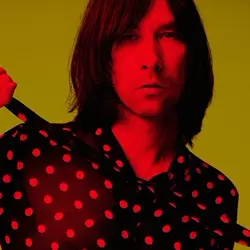 Primal Scream
Primal Scream"We love the duality of ecstasy and pain, that's what we love," Primal Scream's dapper frontman Bobby Gillespie shares. "We love Motown songs, like, "Standing in the shadows of love... [I'm getting ready] for the heartaches to come," or The Supremes, you know, 'Set me free, why don't ya babe?/Get out my life, why don't ya babe?/['Cause] you don't really need me, you just keep me hangin' on'. But when you hear the track you wanna dance to it. It's an uptempo, high energy track that makes you wanna dance, but the lyrics are heartbreaking! And I love that style, I just love that duality of ecstasy and pain and I think we got that on some of this record."
"I just love that duality of ecstasy and pain and I think we got that on some of this record."
Primal Scream's 11th studio album, Chaosmosis, certainly juggles melancholy and euphoria and this scribe particularly rates the track Carnival Of Fools with its taunting, bouncy hook and hushed, jilted vocals. "Oh, I saw Noel Gallagher the other night and he told me that was his favourite song," Gillespie announces proudly. He's obviously looking forward to playing Primal Scream's upcoming European dates and Gillespie admits, "I feel good about myself when I'm on stage, you know, and I can't say I always feel good about myself day to day, I'm not bad these days, years ago — not very good, but it was always like that hour or so onstage where you felt alright about yourself... I think it's why it's addictive; that's why no one can give this touring shit up, you know? I'm sure The Stones don't need any more money, but they're still out there playing... When everybody in the band's on the same beam of light or, you know, hitting the same groove in the same pocket - it's incredible."
Although he believes musicians are "fucking non-verbal", Gillespie says, "I'm fortunate that I can talk, you know, my son is the same - he can talk. And a lot of these guys: they play, but they don't talk, you know? Yeah, interesting. But I think most people can't speak to each other... apart from basic stuff like, 'Can you pass me the sauce?'"
"I'm happy for everyone else to party. I can still have a party, you know, I just do it in a different way now."
Gillespie is sober these days, but that doesn't mean he turns his nose up at those around him who continue to indulge. "I'm happy for people to get wasted, you know? I really don't judge people at all, far from it; I just think that it's cool if that's what people wanna do. It's their life. I just can't handle it, you know; it's just not right for me at this point in my life. So I'm just taking care of my own business and I'm happy for everyone else to party. I can still have a party, you know, I just do it in a different way now. It's not a big deal." When asked whether there's people he avoids now that he's clean, Gillespie offers, "When you quit takin' drugs, a lotta people who used to try and hang out with ya don't wanna hang out with ya anymore, you know? It's almost like the vampires don't wanna — you're livin' in the daytime, you're not livin' in the night time, you know?"
Don't miss a beat with our FREE daily newsletter
He "was a teenager in the '70s" so we're curious to hear whether Gillespie was a Bowie fan. "Yeah, I was a big fan, of course," he admits. "I remember mostly [Bowie] doing Golden Years on Soul Train and he was surrounded by black dancers 'cause they showed that on the British program Top Of The Pops. So that would've been '75? I remember that and I remember thinkin', 'Woah, David Bowie surrounded by these black people - how cool!'" We discuss how rare it was for black artists to mix with white artists back then and Gillespie opines, "They still don't mix, America is a segregated country. They still don't mix, right? And, you know, he was making a point: he was a white English guy who loved black American soul and jazz and blues music and, you know, he was — in the way The Stones were takin' the blues and doing it in the '60s, he was trying to do it on the Young Americans album, you know, and the album after that, mid-'70s. He called it 'plastic soul'. He was taking the Philadelphia sound and trying to do his version of it, you know?" Gillespie concludes that Bowie's appearance on Soul Train was "a very big statement, so it's super-cool. I think he always had a real thing about black America, Bowie. He obviously had a real empathy with black America."
Gillespie says "he could live anywhere" and doesn't "get tied to cities". "I remember we went to America for three weeks and the guys in the band were like, 'We just wanna go home now,' and I was thinkin', 'Fuck, we're just getting goin', this is amazing!' you know? I didn't wanna go home, 'cause I just had a shitty flat in Brighton. I was like, 'I'd rather be here in America.' You know, I guess they were junkies — they wanted to go back and get heroin — so that's why they wanted to go back."


















